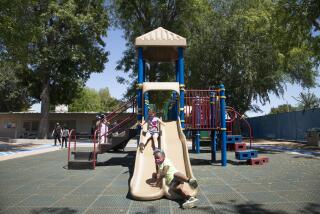Virtual Playground Fight
Should parents control what their kids learn at every step, or step aside and let the teachers do their job? The Times’ Opinion Manufacturing Division asked teachers, parents and education policymakers to participate in an online debate of this question June 5 and 6. Here are excerpts. To read the whole discussion and join the debate today, go to latimes.com/opinionblog.
*
When parents from failing urban schools become involved it often leads to increased conflict and tension. This is because [they] question why music, art and even recess have been taken away from children at some schools, or why the curriculum has become little more than extended test preparation . If they get too involved, these parents may begin to demand greater equity in resources and in the quality of education their children receive.
Pedro Noguera,sociology professor, New York University’s Steinhardt School of Education
*Our modern, large urban school system could not be more unfriendly to parents. [One way to alleviate that would be] co-locating schools with libraries, health facilities and parks, as well as government offices, so our neighborhood schools become part of the community, not chained up at 3 p.m.
former Assembly speaker and Los Angeles mayoral candidate
*
COMMENT:Easy answer Bob Vouchers. But your CTA and AFT friends (meaning campaign donors) care more about their members than the children.
— Flap
*All this works great, unless you live in a place where the school is older than your grandparents and hasn’t had renovations ever.
— Eric
*
My community in New Jersey uses the schools as its own. The fields are filled year round [and] the school auditorium is a performance space. [What’s required] is that schools have enough money to maintain the facilities and pay for utilities. Maybe Hertzberg can squeeze some money out of Sacramento [to do the same for L.A. communities].
— Richard Lee Colvin,director of the Hechinger Institute on Education and the Media at Columbia University
*Just take a look at a map of “failing” schools in LAUSD. Then take a map of poverty concentrations. Excepting a few “resilient” schools, it is almost a perfect overlay. Yet somehow we talk about this at “education” conferences but not in the parent conferences that really matter.
— Steve Zimmer,a teacher and counselor at Marshall High School, is family services director for Elysian Valley United community center
*Many [high school students] don’t like to attend school or do homework. I can teach my best, summon all my enthusiasm, and if a student’s still apathetic, I cannot MAKE him or her learn. Neither can I “punish” a student with anything more than an “F” in the class, and too many students regard their multiple fails with utter calmness. That’s where parents should come in, with praise, bribes, threats, discipline — whatever it takes.
English teacher at San Fernando High
*COMMENT:
Schools shouldn’t make having involved parents the criteria for students’ success. They need to work directly with students [to motivate them] to do whatever it takes to go to college or community college or trade school on their own.
Richard Colvin
*The problem in most schools today is not that teachers or parents are the most able to help; it is that the problems in the classroom are so diverse and pervasive there is little time for teaching left.
Leigh
*
I have been looking for the parent-engagement magic formula — and have not given up but am somewhat disheartened when 2,000 mailers or 500 phone calls bring in 30 parents for an important school meeting.
Bob
*Urban parents still possess a phobia about mathematics and often feel they cannot “help” their children with their homework. My retort is always the story of my own parents, both teachers with master’s degrees from prestigious institutions, who took one look at my high school course work (AP Math, AP Biology, Physics, AP Latin, etc.) and simply told me, “We cannot help you with these classes, but we still expect your best effort and performance.”
— Peter
*Students need support from their parents but most important they need attention.
Jose
*Some parents trust their kids too much, which is fine when they are doing their work, but it’s not when they don’t.
Anabel
*If a student’s parents are involved not just in academics but also in extracurricular activities, the student feels more confident and becomes more disciplined in school work overall.
Karen
*I find it disturbing that more and more parents these days are expecting the school system to raise their children and not taking responsibility for raising their own children.
Samara
*The academic achievement gap among children of different social classes is in place by age 3. To narrow that gap, the nation [should institute] an [extensive] early childhood education program, beginning for infants and toddlers . [Critics] may object that such a program is tantamount to taking children away from their parents, [but] disadvantaged children are already away from their parents, in low-quality day-care settings.
— Richard Rothstein,a researcher at the Economic Policy Institute and a lecturer at Teachers College, Columbia University, is the author of “Class and Schools: Using Social, Economic and Educational Reform to Close the Black-White Achievement Gap.”
*COMMENT:
[Rothstein] says openly what many in the preschool movement will say only privately — let’s move to earlier and earlier ages, get the kids and maximize their brain development starting in the maternity ward. Ross Thompson, a professor at UC Davis who specializes in child development from the earliest years, contends that children need relaxed parents and caregivers who demonstrate their love for their children, play with them, talk to them. They know when to interfere — and when not to. I’m sorry Rothstein appears to have so little confidence in parents’ ability to know much of what their children need, and learn the rest
— Karin Klein, Times editorial writer*
COMMENT:
Klein sets up a false dichotomy. The choice is not between high-quality early childhood care and leaving children in the care of their “relaxed parents and caregivers who demonstrate their love for their children, play with them, talk to them.” Many socio-economically disadvantaged children are not in the care of their parents (who are often working two or more jobs) but rather in low-quality day-care settings. The result is that, according to a recent federal survey, 42% of black fourth-graders watch six hours or more of television a day, compared to 13% of whites.
— Richard Rothstein
*COMMENT:
Rothstein’s focus on the intellectual alone [is] a little unnerving. As Thompson’s research shows, very young children need warm and loving relationships far more than they need complex syntax spoken to them. [Given his] point about how many children are in nonparental care for at least part of their days, I’d be interested to know his opinion of what we should do with these poorly educated parents who are able to and do want to keep their babies at home with them?
— Karin Klein
*I am horrified by the current trend (now more than 30 years old) toward greater and greater academic expectations at younger and younger ages. This flies in the face of all replicable developmental research which shows that forcing early academics on children not only produces no long-term benefits, but in many cases causes serious learning blocks.
— Carolyn
*
A quick perusal of public school conditions tells me the state is not qualified to run a preschool program.
— QK
*
A well-considered, universally available early education system could be a huge boon to our society. But if it only serves to further establish the current one-size-fits-none approach to education at an earlier age, we will continue to fail.
— Stephanie
*
Klein seems to get the whole movement wrong — she doesn’t seem to understand that this whole system is voluntary, and nowhere have I heard anyone forcing elementary-style curriculum on 4-year-olds.
— Julie
*
Education Department data show that poor children enter kindergarten already three months behind the national average in reading and math skills through no fault of their own, and never catch up. The huge deficits in socialization, motivation and intellectual development that they bring to class are beyond the ability of the best schools alone to remedy. If the present patchwork system is working, as Klein maintains, why is this so?
— Walt
*
This if-we-can-only-give-them-the-needed-skills-before-kindergarten-they-will-be-set-for-life nonsense is just that, nonsense.
— Albert
*
L.A. Unified School District’s answer to fitting all the academics and having time for art and music is an all-day kindergarten program. My students are so exhausted after a three-hour and 20-minute rigorous academic program, they all go home and take a nap!
Diana
More to Read
Start your day right
Sign up for Essential California for news, features and recommendations from the L.A. Times and beyond in your inbox six days a week.
You may occasionally receive promotional content from the Los Angeles Times.






